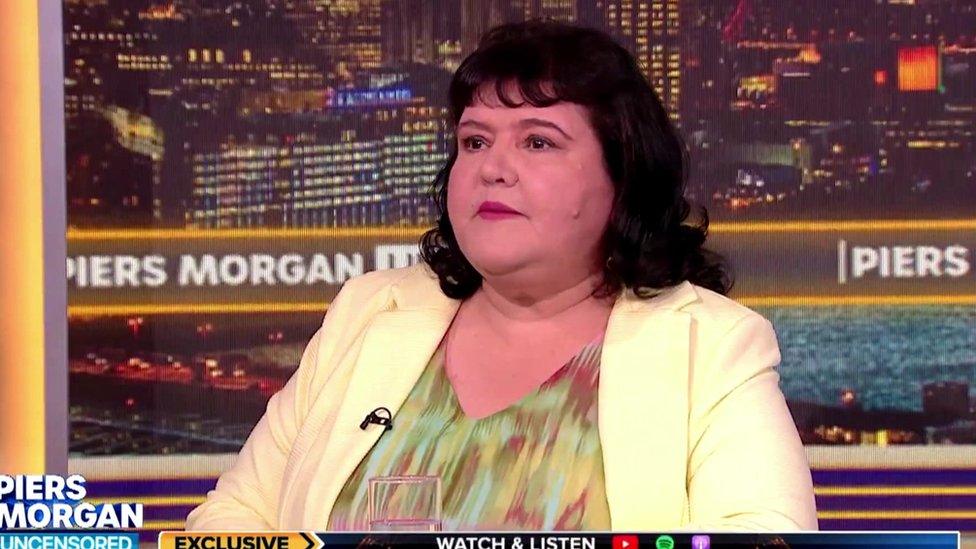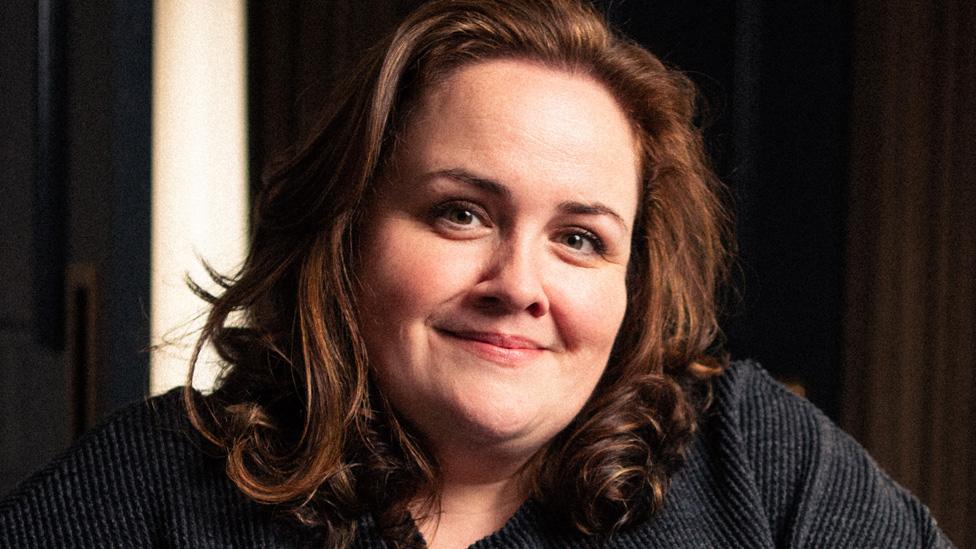Baby Reindeer: Fiona Harvey says she will sue Netflix and writer Richard Gadd
- Published

Fiona Harvey gave an interview to Piers Morgan on Thursday
The woman who has been alleged to have inspired the character Martha in hit drama Baby Reindeer has said she will sue its creator and Netflix.
Fiona Harvey told Piers Morgan that the series, in which Martha is shown as a stalker, was "a work of fiction".
She accused Netflix and Scottish comedian Richard Gadd, who wrote and starred in the show, of "lying" in their "defamatory" depiction.
Representatives for Gadd and Netflix have been contacted by the BBC.
"They have billed it as a true story, and so has he, and it's not," Ms Harvey said in the interview. "He is lying and they are lying."
The 58-year-old Scot gave the interview after being identified online by viewers who attempted to find out who Martha was based on, calling it "absolutely horrendous".
In the interview, she accused Gadd of "making money out of my misery".
Afterwards, the Guardian's Stuart Heritage said, external Morgan's interview "reeked of grubby exploitation", while Ryan Coogan wrote in the Independent, external that "you can no more expect him to be sensitive than you can expect a fish to climb a tree".
But Coogan added: "Morgan isn't the issue here - the real problem with this interview is that there's a market for it at all."
Ed Power wrote in The Telegraph, external the "60-minute conversation was less a sparring match between Morgan and Fiona Harvey than a dreary question-and-answer session".
The BBC has asked Morgan for comment.

In Baby Reindeer, Martha becomes a regular visitor to Donny's pub
Morgan repeatedly challenged Harvey about how many emails, phone calls and letters she sent Gadd. The comedian has said his stalker sent more than 41,071 emails, 350 hours of voicemails, 744 tweets, 46 Facebook messages and 106 pages of letters.
Ms Harvey told Morgan there "may have been a couple of emails" and later said there were "less than 10" emails.
She said she sent him one letter and 18 tweets but no Facebook messages, and said she "doubts" he has those voice messages because she didn't have his phone number.
Morgan also questioned her about the fact she uses six email addresses, and pushed her on other questions such as the grade she got in her law degree.
Towards the end of the interview, Harvey said she would also sue the Daily Mail newspaper. The BBC has contacted them for comment.
'Alarm bells'
In a column for the Sun newspaper published on Thursday evening, Morgan wrote: "On a human level, I felt sorry for her that she's been publicly dragged through the mincer like this.
"But there were moments in the interview where my suspicious alarm bells rang loud."
The BBC contacted Harvey following her interview but she was not immediately available for comment.
She reportedly told the Daily Record, external that she was "not happy" with the interview and that she had been paid £250 to take part.
Sleeper hit
Baby Reindeer, a word-of-mouth hit for the streaming giant, has left many people fascinated and disturbed.
She emphatically denied the veracity in real life of key scenes in the series, including one where the Martha character is depicted as sexually assaulting Gadd along a canal and attacking his partner.
She also denied harassing Gadd's family, or turning up at his house. "I'm not a stalker," she said.
At the end of the series, Martha is seen pleading guilty of stalking Gadd and is sentenced to nine months in jail.
But Harvey insisted she has never been charged with an offence, let alone going to prison.
"That is completely untrue, very, very defamatory to me, very career damaging," she said.
Internet sleuths
When viewers began to speculate over the real people behind the series, Gadd, 34, posted a message to his Instagram story, urging people not to speculate.
"That's not the point of our show," he wrote.
On Wednesday Netflix policy chief Benjamin King told UK lawmakers at a parliament hearing focused on British film and television, that they took "every reasonable precaution" to disguise the identities of the people who inspired Gadd's work.
"We didn't want to anonymise that or make it generic to the point where it was no longer his story because that would undermine the intent behind the show," he said.
"Ultimately, it's obviously very difficult to control what viewers do, particularly in a world where everything is amplified by social media. I personally wouldn't be comfortable with a world in which we decided it was better that Richard was silenced and not allowed to tell the story."
Related topics
- Published4 May 2024
- Published29 April 2024
- Published20 April 2024
